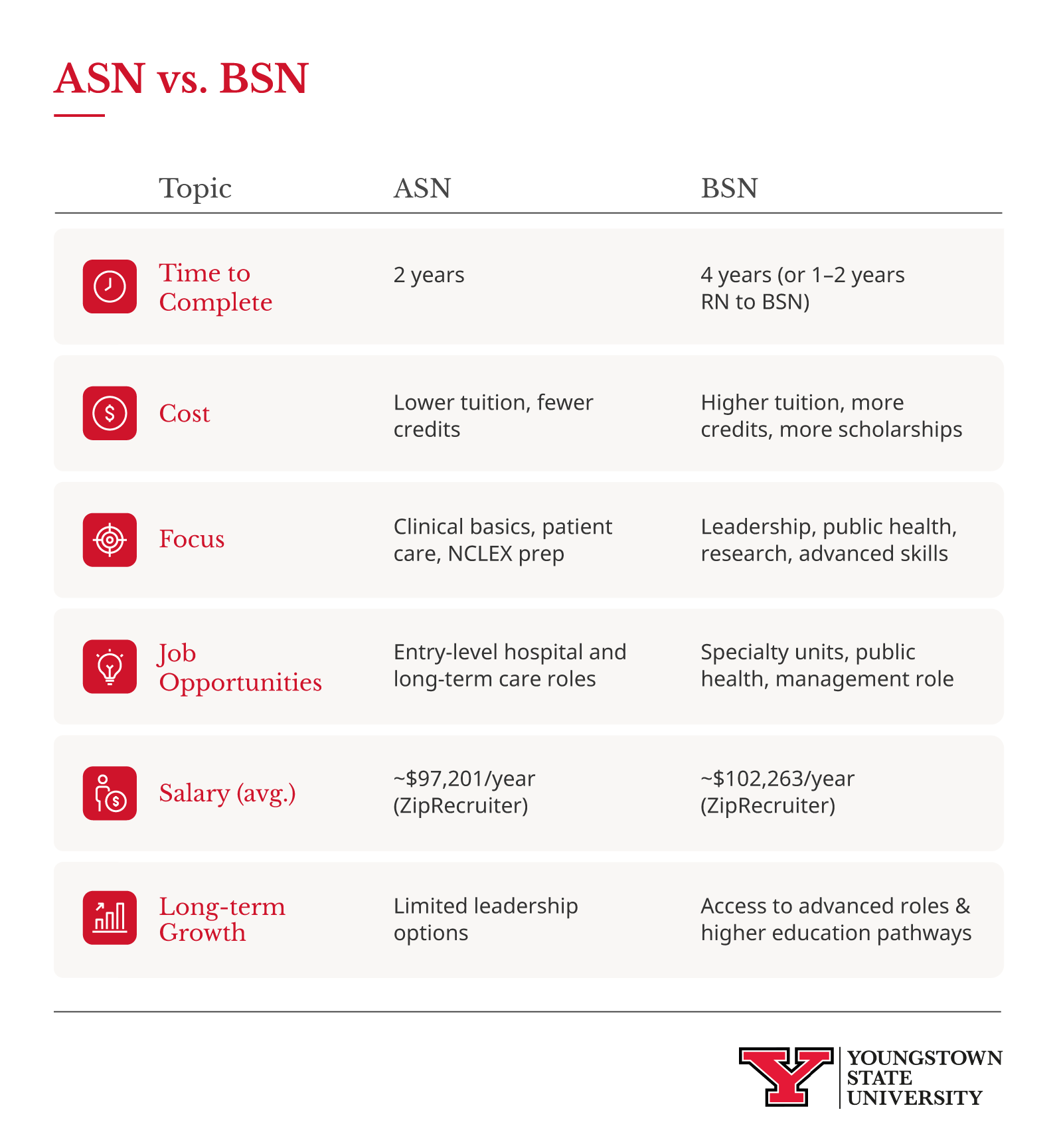
The choice between an Associate of Science in Nursing (ASN) and a Bachelor of Science in Nursing (BSN) can shape your entire nursing career for years to come. Both plans prepare you to take the NCLEX exam and are valid pathways to becoming a registered nurse. However, the journey itself and the long-term outcomes typically differ dramatically.
Many nurses start with an ASN to enter the workforce quickly. It’s an efficient route to gain the hands-on experience needed to begin earning and start helping patients sooner. However, the BSN degree can open doors that an ASN simply can’t. Hospitals are increasingly listing BSN-prepared nurses as a prerequisite for leadership roles, specialty positions and Magnet-recognized facilities. Plus, on average, nurses with a BSN earn $3.89 more per hour than those with an associate degree, according to recent salary data.
If you’re already an RN and want to move forward, programs like the online RN to BSN program from Youngstown State University (YSU) make advancing your education flexible and achievable. This next step can help you build your leadership skills, significantly expand your scope of practice and create brand new opportunities in the field.

ASN vs. BSN: A Side-by-Side Comparison
Both ASN programs and BSN programs lead to becoming a registered nurse. However, they differ in how they prepare students and the doors they can open in the long run. The associate degree in nursing offers a quicker path to employment, while the bachelor’s degree provides a stronger foundation for leadership, advanced practice and higher earning potential.
The table below gives you the main differences between the two paths:
| Feature | ASN | BSN |
| Length of program | About two years at most community colleges, nursing schools or technical schools | Four years for a traditional BSN; one to two years for an RN to BSN |
| Cost range | Lower tuition at community colleges and fewer credit hours overall | Higher tuition at universities and more credits, but also more scholarships |
| Coursework/training focus | Core nursing education, direct patient care, preparation for NCLEX | Includes all ASN coursework, plus nursing theory, leadership, public health and research |
| Job opportunities | Entry-level nursing positions in hospitals, clinics and long-term care | Expanded roles in management, public health, case management and specialty care |
| Salary range | $29,500-$167,000 with an average of $97,201/year
Source: ZipRecruiter |
$42,000-$188,000 with an average of $102,263/year
Source: ZipRecruiter |
Both of these degrees prepare you for clinical experience and licensure, but the BSN offers a broader career scope. Over time, the difference becomes clear. Studies show BSN-prepared nurses can earn $500,000 more over a 35-year career. This advantage presents itself as access to leadership positions, specialty roles and pathways to graduate nursing education.
What You’ll Learn: Curriculum Differences
ASN and BSN degrees share a common foundation in nursing skills and preparation for direct patient care, but their academic depth differs. The ASN focuses on core courses and hands-on training to get nurses into the nursing field quickly with adequate training under their belt.
A BSN-prepared nurse, on the other hand, completes additional coursework that builds leadership, research and broader community perspectives. Research from the American Association of Colleges of Nursing (AACN) has linked BSN-educated nurses to improved patient outcomes. This means having a BSN accreditation is a valuable investment in both your career and the healthcare system overall.
ASN curriculum highlights:
- Emphasis on clinical basics and essential patient care techniques
- Courses in pharmacology to safely administer and titrate medications and understand drug interactions
- Preparation for the NCLEX exam and a strong focus on bedside practice
- Training concentrated on immediate entry and hospitals and long-term care facilities
BSN curriculum highlights:
- Courses in nursing theory expanded into leadership and evidence-based practice
- A community health and population-based care strategy focus
- Integration of informatics and technology to improve decision-making and care delivery
- Advanced critical thinking skills are developed, meaning nurses can handle more complex clinical scenarios
- Broader education that prepares graduates for management, public health and specialty positions
Why Hospitals May Prefer BSN-prepared Nurses

Health care systems and hospitals around the country are adopting higher standards of education for nursing staff. Magnet hospitals, known for excellence in patient care, typically seek out BSN-prepared nurses as evidence links them to improved organizational performance.
Employers recognize that BSN nurses can bring more than just bedside experience. Their expanded education prepares them for leadership roles, case management, critical care and advanced practice within complex care settings. They also have stronger critical thinking, research and knowledge of community health. These qualities align with more modern care models and emphasize prevention and coordinated care.
The 2023 Employment Research Brief from the AACN shows that 25% of hospitals and other healthcare settings now require new hires to hold a bachelor’s degree in nursing. Nearly 70% express a strong preference for graduates of BSN programs.
This trend means that nurses with a BSN have access to more competitive nursing positions, higher pay potential and more stability in their long-term careers. For healthcare professionals looking to move into roles like nurse manager or specialty units, earning a higher education accreditation like a BSN is starting to look less like an advantage and more like an expectation.
Career Outcomes: What You Can Do With Each Degree
Graduates of an ASN program typically begin in bedside or general care positions. These roles allow nurses to gain hands-on experience and build confidence in clinical environments. Common positions typically include:
- Staff nurse roles in hospitals or clinics
- Positions in long-term care facilities, which include rehabilitation centers
- Roles in outpatient settings, such as ambulatory surgical centers
- Opportunities to work in departments like pediatric or mental health, though this is dependent on employer requirements
Career Opportunities With a BSN
A BSN expands access to roles that go beyond basic care. These often involve leadership or specialized practice. Graduates can pursue:
- Nurse manager positions, where they oversee teams and care coordination
- Community health or case manager positions within public health settings
- Specialized practice areas, such as geriatrics and intensive care, that require more advanced preparation
- Pathways to graduate education, including MSN programs and progression to becoming a nurse practitioner or other advanced roles
The U.S. Bureau of Labor Statistics (BLS) is projecting a 6% growth of registered nursing jobs from 2023 to 2033, which is much faster than the average for all occupations. With healthcare demand rising, especially in areas like geriatrics and community care, nurses who hold a BSN are poised to take advantage of expanding opportunities in both traditional and advanced roles.
Advancing via an RN to BSN Program

If you’re a registered nurse with an ASN, the next logical move is earning a BSN to open doors for leadership roles and advanced specialties. An RN to BSN program allows RNs to keep their jobs while advancing their level of education, making career growth both obtainable and realistic.
YSU offers a fully online program that’s designed with working nurses in mind. The BSN program can be completed in as few as 10 months and requires just 28 core credit hours. YSU accepts a block credit transfer of 76 credits from your ASN, helping you save time and stay on track. The program is fully accredited by both CCNE and ACEN, meaning that graduates meet the high standards recognized throughout the healthcare industry.
Why choose YSU’s RN to BSN?
- Offers a flexible format built for working nurses
- Features a supportive faculty that teaches both online and on campus
- Includes courses that cover leadership, community health, and evidence-based practice
- Provides opportunities to strengthen your clinical reasoning and broaden your career path
- Helps BSN students succeed while balancing their professional and personal responsibilities
One recent graduate, Tammy Weaver, shared their feedback:
“The RN to BSN program showed me that there are a lot of different things I could do better. It really widened my horizons. … I was nervous about doing an online program, but it was a smooth transition and easy to do with the way the modules are set up.”
For nurses ready to take the next step, exploring YSU’s RN to BSN online program is a practical way to enroll in a program that supports your goals and positions you for long-term success.
Which Degree Matches Your Nursing Career Goals?
The choice between pursuing an ASN and a BSN often comes down to your career goals and personal circumstances. An ASN is ideal for budding nurses who need a cost-effective route to enter their nursing career quickly. This makes ASN programs a good fit for anyone who just wants to start working in healthcare without additional education.
In contrast, earning a bachelor’s degree in nursing equips you with leadership skills, a much broader scope of practice and strong qualifications for advanced positions. Both degrees serve as a foundation for success, but the BSN creates more opportunities for salary, specialization and long-term career growth.
If you’re an RN looking to take the next step, consider a degree program that fits your schedule and builds on your experience. YSU’s flexible and fully online option makes it simple to advance while continuing to work. Start shaping your future today by exploring YSU’s online Registered Nurse to Bachelor of Science in Nursing program and get started with an online application today.
FAQ
Are you curious about how an ASN or BSN can shape your future in nursing? These are the questions many nursing students ask when planning their next steps, plus answers that explain how each path influences licensure and career advancement for nurses.
Can you become an RN with an ASN or BSN?
Yes. Graduates of both ADN/ASN and BSN nursing programs are qualified to take the National Council Licensure Examination (NCLEX-RN) to gain licensure and become a registered nurse. After passing the NCLEX, graduates can work in nursing positions across hospitals and clinics and gain valuable practical nursing experience.
Do both ASN and BSN graduates qualify to sit for the NCLEX-RN?
Yes, both ASN and BSN graduates become eligible to sit for the NCLEX-RN exam. This test is required for licensure as a registered nurse. Successful completion means nursing students are free to start their careers in clinical practice.
What are the main reasons nurses go back to school for a BSN?
Nurses who have completed an ASN return to school to complete a BSN to access leadership roles, qualify for placement in Magnet hospitals and secure long-term career advancement. Completing a BSN also lays the groundwork for graduate study, such as a Master of Science in Nursing (MSN).
Is there a difference in pay between ASN and BSN RNs?
Yes. While both degrees lead to RN licensure, BSN graduates often secure higher-paying nursing positions and have better opportunities for career advancement. Hospitals value nursing education that includes leadership and research, both of which are included in a BSN program.
What’s the fastest way to move from ASN to BSN?
The fastest way to move from ASN to BSN is to enroll in an accredited RN to BSN program, such as the one offered by Youngstown State University. Online courses such as these can be completed full-time in as few as 10 months. Additionally, they allow nurses to continue working while studying, offer financial aid and flexible schedules and include coursework that builds on existing clinical practice.


